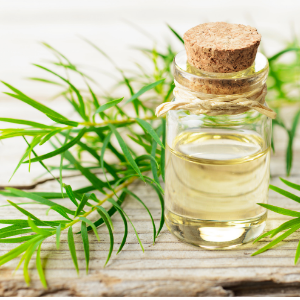Tea Tree Oil
Tea Tree Summary
Botanical name: Melaleuca alternifolia
Introduction:
Tea tree oil can also be known as a melaleuca oil. This oil is an essential oil that comes from steaming the leaves of the Australian tea tree. The Australian shrub can reach 20 feet in height. It is believed that before antibiotics and prescriptions medications were discovered, the native Australians were known to use this oil for various health and mental benefits.
History:
Tea tree oil has been traced and learned even back to WWII. Soldiers learned from the civilians how tea tree oil was beneficial during the first aid process and for quicker healing time of wounds. Arthur Penfold conducted science research and proved that tea tree oil has many properties including antibacterial, anti-inflammatory, anti-fungal, and antimicrobial.
Modern Day Use:
A very current commonly used oil, tea tree oil is sold today over the counter in a dark bottle to protect the oil from exposure to light to better preserve its potency.
MEDICINAL: Anti-inflammatory, Antibacterial, Anti-microbial, Antiviral, Antiseptic, Expectorant, Fungicide, Stimulant, Sudorific.
Household: Used in cleaning products such as laundry soaps, hand soaps, polishes, air fresheners, and insect repellents.
Constituent Profile:
The main constituent is terpinen-4-ol which is known for is anti-bacterial properties.
Other minor constituents:
Pinene is known for its anti-inflammatory, antiseptic, expectorant, and bronchodilator properties.
Sabinene is said to work as an antioxidant exhibiting anti-microbial and antifungal properties. For this reason, it is reputed to work on skin inflammations.
The remaining minor constituent profiles are known to contain anti-inflammatory, analgesic, antibiotic, sedative, and anti-fungal properties.
Due to the powerful anti-fungal and anti-bacterial properties, tea tree is often used for the following ailments:
· Acne
· Athlete’s foot
· Colds
· Coughs
· Dandruff
· Head lice
· Insect bites
· Itching
· Minor burns
· Skin rashes
· Toenail fungus
When tea tree is used in aromatherapy, the scent has been known to reduce feelings of stress, fatigue, and brain fog.
Tea tree oil can also be used in household cleaning products to eliminate mold, and some bacteria on solid surfaces. When diffused, it can also have a cleaning effect on the air.
Hazardous Facts:
Tea tree oil is poisonous when taken orally. If swallowed, serious symptoms can develop. This oil is best beneficial for external application, diffusing and as a household cleaning agent.

